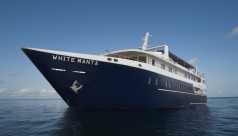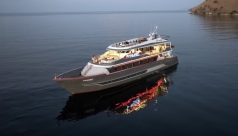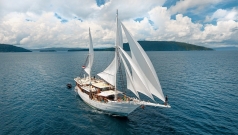Raja Ampat Liveaboard Trips
Indonesia liveaboards have access to the greatest marine diversity on Earth, with over 3,000 different species of fish and 600 coral species. Raja Ampat is at the heart of this bio-diversity and is responsible for many of the amazing statistics Indonesia can boast. For this reason, Raja Ampat is the discerning diver's liveaboard destination of choice who want nothing but the best. So to book a trip here, you are really treating yourself. It is also a very remote and largely untouched area with stunning topside scenery - turquoise seas peppered with small vaulting verdant islands.
Below the waves can be nothing short of incredible. Amazing macro opportunities abound in Raja Ampat as well as stunning reefscapes and huge schools of fish in varieties that mean, regardless of your experience, you will almost certainly enjoy first-time encounters. Schools of manta rays, wobbegongs and pygmy seahorses are just some of the main characters that you can see. [More details on these dive sites: Raja Ampat].
> [More details:
Raja Ampat Liveaboard Trips]
Komodo Liveaboard Trips
The Komodo National Park is firmly established as one of the world's top diving regions. Enjoying nutrient-rich water, brightly-coloured reefs, critters galore and currents which bring in big pelagics, scuba diving in Komodo is consistently excellent. With such a variety of sites plus the added bonus of island visits and encounters with the famed dragons of Komodo Island, it's the perfect location for Indonesia liveaboard diving tours. Where else can you experience such vibrant colourful reefs, encounters with manta rays and sharks, amazing macro sites and shore visits to remote islands, some of which are home to dragons?!
Some divers wish to maximise their time in the park itself, but several routes include the dive sites at Moyo, Sangeang and Satonda islands, along the north coast of Sumbawa, or Flores and Alor. These destinations add variety to an already superb trip itinerary. [More details on these dive sites: Komodo, Sumbawa Trips].
> [More details:
Komodo Liveaboard Trips]
Cenderawasih Trips
This is one of the newest destinations to have opened up in Indonesia and has become something of a sensation for its whale shark activity. Unlike other destinations where the occasional whale shark may cause a stir, in Cenderawasih Bay it is common to see 3, 4 or 5 whale sharks at any one time. They gather close to the surface to feed from the by-catch of local fishermen, as they have been doing for generations. Your photographs will be amazing! [More details on these dive sites: Cenderawasih Bay].
The Cenderawasih region also witnessed a lot of action during the second world war and it is home to range of fascinating wrecks that now inhabit a watery grave. There are also a number of interesting macro opportunities with more dive sites being discovered all the time. What really sets this destination apart is the unknown and Indonesian liveaboards are the only viable way to see much of this region of West Papua. Just a few boats visit Cenderawasih Bay and they have only been doing so for a relatively short time so the area is still revealing its secrets to those pioneering divers who seek to boldly go ...
> [More details:
Cenderawasih Trips]
Triton Bay Trips
In most other countries, places like Triton Bay would be the pinnacle of scuba diving. It is testament to Indonesia's wealth of quality dive spots that Triton Bay can be dwarfed by its more celebrated neighbours like Raja Ampat and the Banda Sea. However, Triton is a magnificent region in its own right. Its topside scenery is striking, with huge sheer cliffs rising from the water and topped by lush foliage. You may even be shown ancient cave paintings from the dive boat. Underwater, it boasts fabulous coral coverage, including soft corals and black coral forests, plus vast schools of fish and sharks including epaulette and whale sharks. If you are lucky you might even see pilot whales. [More details on these dive sites: Triton Bay].
Triton Bay is often part of a cruise that includes the Banda Sea or Raja Ampat. Such a tour makes for an unforgettable experience and indeed a liveaboard is the only way to easily dive Triton Bay.
> [More details:
Triton Bay Trips]
Banda Sea - Ambon and Banda Islands Trips
Banda is a region of the country with many unique characteristics. It is now becoming recognised as a world-class liveaboard diving destination, emerging from the shadows of Komodo and Raja Ampat, its better-known neighbours. Including the critter haven of Ambon, Banda represents huge variety both in terms of the type of diving and the volume of myriad creatures you will encounter. If you visit here, you will be not only diving in an underwater paradise but also touring a region of historical significance given that the Spice Islands once played a starring role in world trade.
The region's small population keeps the waters pristine and the marine life, both large and small, thriving. [More details on these dive sites: Ambon, Banda].
> [More details:
Banda Sea - Ambon and Banda Islands Trips]
Wakatobi Trips
The remote Wakatobi archipelago in south Sulawesi is one of the most exciting destinations in Indonesia, pure diving pleasure in a far-flung paradise island setting. These pristine reefs have won extraordinary praise for their abundant fish life and healthy corals. Their national park status also means there are restrictions on fishing which is good news for the marine life. [More details on these dive sites: Wakatobi].
Unlike at Komodo Island or Raja Ampat, you won't see many other liveaboard boats in the area so you will get the feeling that the coral reefs here are exclusively for you!
> [More details:
Wakatobi Trips]
Flores - Alor Trips
A little visited region of Indonesia, Alor and Flores liveaboard safaris promise some top quality diving without the competition for space that can be seen elsewhere. Not many dive boats visit here so you can be more confident of having the sites to yourself. Varied dive sites, superb macro-life, a low human population, and excellent visibility make this a relatively undiscovered gem of a destination. [More details on these dive sites: Alor, Flores].
Most of the liveaboards visit here on a wider trip including Komodo, or Banda or even Raja Ampat. Shore visits are often a key feature of these expeditions. You might experience a visit to a whaling village or a weaving village, as well as a local market, or an excursion to Komba volcano or Kelimutu lakes.
> [More details:
Flores - Alor Trips]
Transit Diving Trips
Once or twice per year, most of the liveaboards in Indonesia will complete their scheduled diving cruises in one destination and move on to a new region, usually due to changes in climate and sea conditions. To achieve this they must often cross vast stretches of relatively unexplored water such as the Banda Sea, the Flores Sea, and throughout The Moluccas. During these crossings, the crew take the opportunity to alter course to dive at islands that mark the way, often visiting areas that may have never been dived before.
Typical tour routes are from Komodo to Alor; Alor to Triton Bay or Raja Ampat, Raja Ampat to Ambon; Ambon back to Flores or Alor. These charters are known as Transit Trips and are often the favourites of very experienced divers and of the dive guides themselves. This is due to the exciting adventure of diving in unchartered waters and to the unpredictable nature of the cruise - you just never know what you might encounter on these cruises.
> [More details:
Transit Diving Trips]



















































